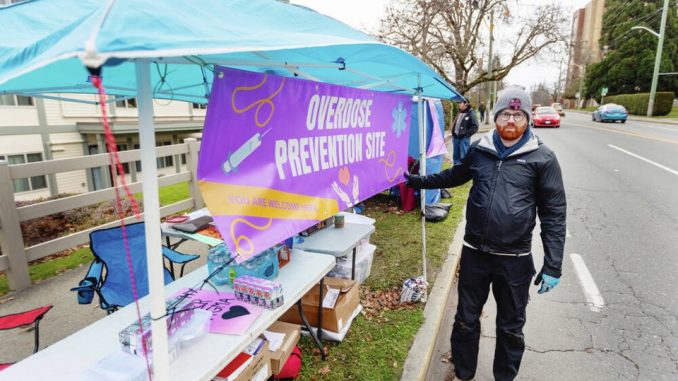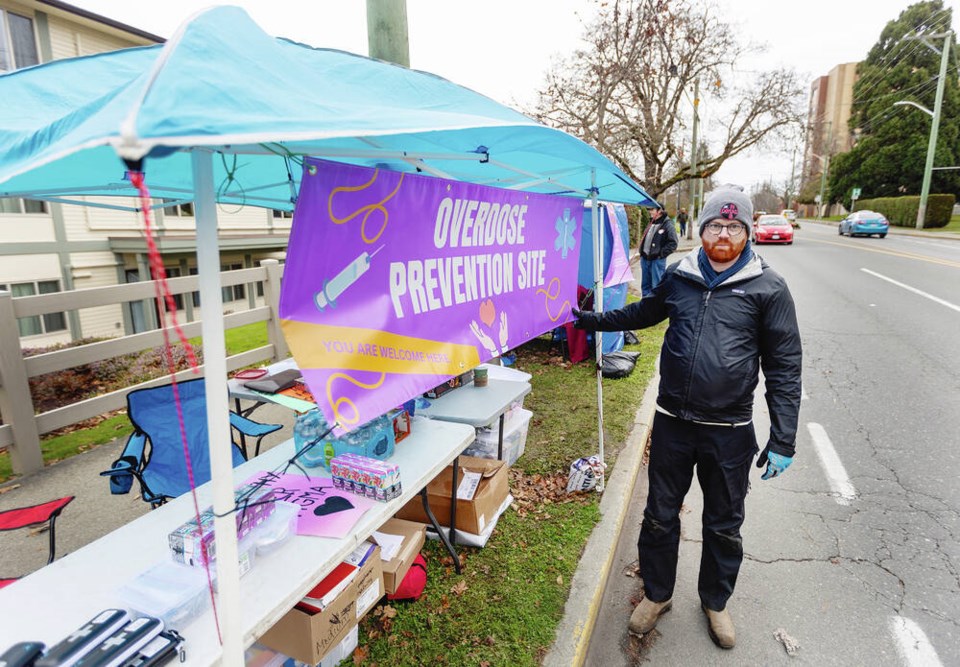
‘This is an example of why services like this are needed,’ doctor says
by Cindy E. Harnett from the Times Colonist – Read the source article here

A patient fatally overdosed at Nanaimo Regional General Hospital on Tuesday shortly after a nearby pop-up service to prevent such deaths had closed, according to a hospital addictions physician.
On Monday, two unsanctioned overdose prevention sites were set up, one near the Nanaimo hospital and another across from Victoria’s Royal Jubilee Hospital.
They were organized by Island addictions physicians to protest an increased number of overdose deaths on hospital grounds they say are due to the lack of designated sites at hospitals for drug consumption. Such sites were promised last year by Island Health in Victoria, Nanaimo and Campbell River.
A patient in a wheelchair and well-known to Nanaimo hospital staff used the pop-up overdose prevention site on Monday while awaiting admission through Nanaimo’s emergency department, said addictions specialist Dr. Jess Wilder.
“He had recently been housed and we hadn’t seen him at the hospital in a really long time, but he came in to the emergency department [Monday], and he was very sick and needing to be admitted,” said Wilder. He was escorted back to the emergency department in the evening after the site, which opened at 10 a.m., closed at 6 p.m.
At about 4 a.m. Tuesday “he overdosed in the bathroom of the emergency department and died,” she said.
Staff used Narcan in hopes of reversing the overdose and CPR was rendered for about 20 minutes, she said. The B.C. Coroners Service confirmed the death.
“So this is an example of why services like this are needed and why they need to have adequate, fully staffed hours at all times that people are using substances, which is all day, every day,” said Wilder. “Nurses who were caring for him in the emergency department thanked us for providing him a safe place to use, and when he didn’t have that option, he used somewhere where he wouldn’t be found in time, and he died, and our team is devastated.”
On Monday alone, seven patients at Nanaimo Regional General Hospital used the pop-up overdose prevention site, along with three community members who otherwise would have ended up in the emergency department.
Wilder said she was unable to access statistics on overdose deaths in hospital “but I know that on at least a weekly basis, currently, they are having to support an overdose in some way, shape or form, on hospital grounds.”
One argument against the need for overdose prevention sites on hospital grounds is that addiction-medicine consult teams manage the needs of medical patients with addictions.
The teams, staffed by physicians, nurses and often social workers, create care plans for patients that can include opioid agonist therapies such as methadone, suboxone or kadian, or pharmaceutical alternatives or a combination of both.
Wilder, physician lead on the addictions medicine team in Nanaimo’s hospital, said it’s an “incredible team,” including a doctor and nurse, social worker and support workers.
Some medical patients are ready to go on prescribed safer supply drugs, some are ready to go on medications to stabilize their opioid use such as methadone, while others may be ready to enter treatment or recovery services, she said. “But sometimes people who use substances are not ready to make changes, and they wish to continue using the substances that they’re using, and we can support them to do that in the least harmful way possible.”
“People who use substances deserve to access hospital services as much as people who don’t use substances,” she said.
Victoria family and addictions physician Dr. Ryan Herriot, who organized the overdose prevention pop-up outside Royal Jubilee Hospital, said without the services, hospital patients leave the facility and use in bushes “where they may be found too late and die.” Herriot doesn’t think there are weekly overdose deaths at the hospital but he said it’s a weekly occurrence that someone addicted to drugs feels they must leave hospital or is asked to leave or has their drugs confiscated.
“The status quo is intolerable,” he said, adding there’s no one-size-fits-all approach to caring for people with addictions seeking medical help in hospital.
“Drug use is complex. It’s multi-factorial. It’s driven by many things, more than just physical symptoms of withdrawal, though that’s a big one,” said Herriot.
Late on Tuesday, Victoria police asked the doctor on site at the Victoria pop-up to shut down the drug consumption portion given that public drug use is illegal and the site was unsanctioned. The site closed a short time later due to poor weather conditions. Organizers were unsure whether it would resume today.
ceharnett@timescolonist.com
Leave a Reply
You must be logged in to post a comment.